

Frederick (Captain Thunderbolt) Ward. Frederick Ward (1835-1870), bushranger, alias 'Captain Thunderbolt', was born at Windsor, New South Wales.
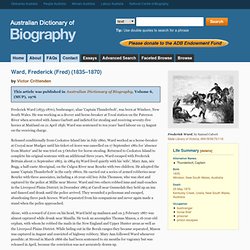
He was working as a drover and horse-breaker at Tocal station on the Paterson River when arrested with James Garbutt and indicted for stealing and receiving seventy-five horses at Maitland on 21 April 1856; Ward was sentenced to ten years' hard labour on 13 August on the receiving charge. Released conditionally from Cockatoo Island late in July 1860, Ward worked as a horse-breaker at Cooyal near Mudgee until his ticket-of-leave was cancelled on 17 September 1861 for 'absence from Muster' and he was tried on 3 October for horse-stealing.
Returned to Cockatoo Island to complete his original sentence with an additional three years, Ward escaped with Frederick Brittain about 11 September 1863. in 1864-65 Ward lived quietly with his 'wife', Mary Ann, née Bugg, a half-caste Aboriginal, on the Culgoa River near Bourke with two children. Citation details. Captain Thunderbolt - Tocal's bushranger. Thunderbolt didn't kill anyone Thunderbolt was involved in several shootouts with police, so the fact that he never killed anyone may have been luck, but it added weight to the belief that Thunderbolt was the Gentleman Bushranger, the last of the professional highwaymen.
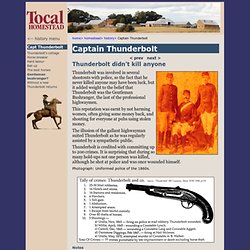
This reputation was earnt by not harming women, often giving some money back, and shouting for everyone at pubs using stolen money. The illusion of the gallant highwayman suited Thunderbolt as he was regularly assisted by a sympathetic public. Thunderbolt is credited with committing up to 200 crimes. It is surprising that during so many hold-ups not one person was killed, although he shot at police and was once wounded himself. Photograph: Uniformed police of the 1860s. Notes 1. Captain Thunderbolt. Frederick Ward Frederick Wordsworth Ward (aka Captain Thunderbolt) (1835–25 May 1870) was an Australian bushranger renowned for escaping from Cockatoo Island, and also for his reputation as the "gentleman bushranger" and his lengthy survival, being the longest roaming bushranger in Australian history.[1] Early years[edit] Frederick Ward was the son of convict Michael Ward ("Indefatigable" 1815) and his wife Sophia, and was born in 1835 around the time his parents moved from Wilberforce, New South Wales to nearby Windsor.[2] Ward entered the paid workforce at an early age, and was employed at aged eleven by the owners of Aberbaldie station near Walcha as a "generally useful hand" although he remained with them for only a short time.[3] He worked at many stations in northern NSW over the next 10 years, including the famed horse-stud Tocal, and his horsemanship skills soon became evident.
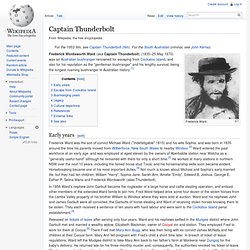
Escape from Cockatoo Island[edit] Bushranging years[edit] Legacy[edit] Cultural depictions[edit] Australian Crimes - BUSHRANGERS. Australian Bushrangers. Captain Thunderbolt - Tocal's bushranger. Thunderbolt's Cottage Fred Ward worked at Tocal before becoming the notorious bushranger Captain Thunderbolt.
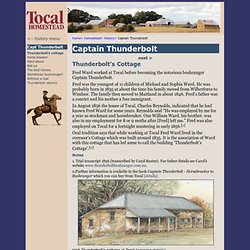
Fred was the youngest of 11 children of Michael and Sophia Ward. He was probably born in 1835 at about the time his family moved from Wilberforce to Windsor. The family then moved to Maitland in about 1846. Fred's father was a convict and his mother a free immigrant. In August 1856 the lessee of Tocal, Charles Reynolds, indicated that he had known Fred Ward for some years.
Bushranger. History[edit] More than 2000 bushrangers are believed to have roamed the Australian countryside, beginning with the convict bolters and drawing to a close after Ned Kelly's last stand at Glenrowan.[3] 1850s: gold rush era[edit] The bushrangers' heyday was the Gold Rush years of the 1850s and 1860s as the discovery of gold gave bushrangers access to great wealth that was portable and easily converted to cash.
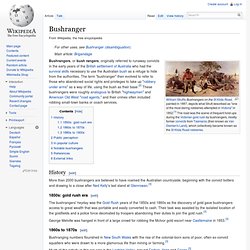
Their task was assisted by the isolated location of the goldfields and a police force decimated by troopers abandoning their duties to join the gold rush.[3] John Gilbert (bushranger) Engraving of John Gilbert Johnny Gilbert was an Australian bushranger shot dead by the police at the age of 23 near Binalong, New South Wales on 13 May 1865.
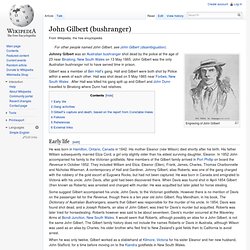
John Gilbert was the only Australian bushranger not to have served time in prison. He was born in Hamilton, Ontario, Canada in 1842. His mother Eleanor (née Wilson) died shortly after his birth. BUSHRANGERS - Frank Gardiner. Francis (Frank) Gardiner. Francis (Frank) Gardiner (1830-1903?)
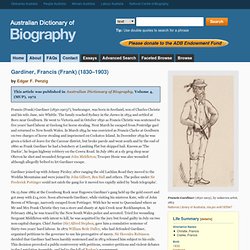
, bushranger, was born in Scotland, son of Charles Christie and his wife Jane, née Whittle. The family reached Sydney in the James in 1834 and settled at Boro near Goulburn. He went to Victoria and in October 1850 as Francis Christie was sentenced to five years' hard labour at Geelong for horse stealing. Next March he escaped from Pentridge gaol and returned to New South Wales.
In March 1854 he was convicted as Francis Clarke at Goulburn on two charges of horse stealing and imprisoned on Cockatoo Island. Gardiner joined up with Johnny Piesley; after ranging the old Lachlan Road they moved to the Weddin Mountains and were joined by John Gilbert, Ben Hall and others. On 15 June 1862 at the Coonbong Rock near Eugowra Gardiner's gang held up the gold escort and got away with £14,000. Clarke brothers. Thomas (1840?
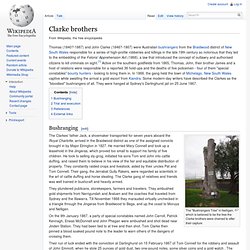
-1867) and John Clarke (1846? -1867) were Australian bushrangers from the Braidwood district of New South Wales responsible for a series of high-profile robberies and killings in the late 19th century so notorious that they led to the embedding of the Felons' Apprehension Act (1866), a law that introduced the concept of outlawry and authorised citizens to kill criminals on sight.[1] Active on the southern goldfields from 1865, Thomas, John, their brother James and a host of relations were responsible for a reported 36 hold-ups and the deaths of five policemen - four of them "special constables" bounty hunters - looking to bring them in.
In 1866, the gang held the town of Michelago, New South Wales captive while awaiting the arrival a gold escort from Kiandra. Some modern-day writers have described the Clarkes as the "bloodiest" bushrangers of all. They were hanged at Sydney's Darlinghurst jail on 25 June 1867.